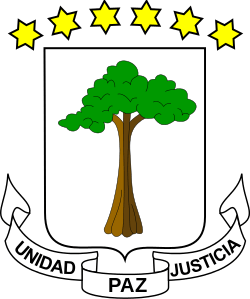Equatorial Guinean legislative election, 1993
 |
|---|
| This article is part of a series on the politics and government of Equatorial Guinea |
| Administrative divisions (provinces) |
|
Parliamentary elections were held in Equatorial Guinea on 21 November 1993, the first multi-party election in the country since 1968. Although seven parties were allowed to run in the election, the ruling Democratic Party of Equatorial Guinea (PDGE) maintained its grip on power, winning 68 of the 80 seats in the enlarged Chamber of People's Representatives.[1] The Joint Opposition Platform, an alliance of eight opposition parties, called for a boycott and claimed voter turnout was as low as 20%,[1] although it was reported to be 67.5%.[2] The alliance's leaders were prevented from travelling to the mainland to campaign for the boycott and some were banned from leaving the country. Following the election, the Spanish Foreign Minister Javier Solana claimed the elections were not free and fair, an opinion shared by other observers.[1]
Results
| Party | Votes | % | Seats | +/– |
|---|---|---|---|---|
| Democratic Party of Equatorial Guinea | 54,589 | 69.8 | 68 | +8 |
| Social Democratic and Popular Convergence | 8,042 | 10.3 | 6 | New |
| Social Democratic Union | 5,760 | 7.4 | 5 | New |
| Liberal Party | 4,974 | 6.4 | 1 | New |
| Liberal Democratic Convention | 1,963 | 2.5 | 0 | New |
| Socialist Party of Equatorial Guinea | 1,106 | 1.4 | 0 | New |
| Social Democratic Party | 909 | 1.2 | 0 | New |
| National Democratic Union of Equatorial Guinea | 880 | 1.1 | 0 | New |
| Invalid/blank votes | 512 | – | – | – |
| Total | 78,736 | 100 | 80 | +20 |
| Registered voters/turnout | 116,666 | 67.5 | – | – |
| Source: Nohlen et al. | ||||